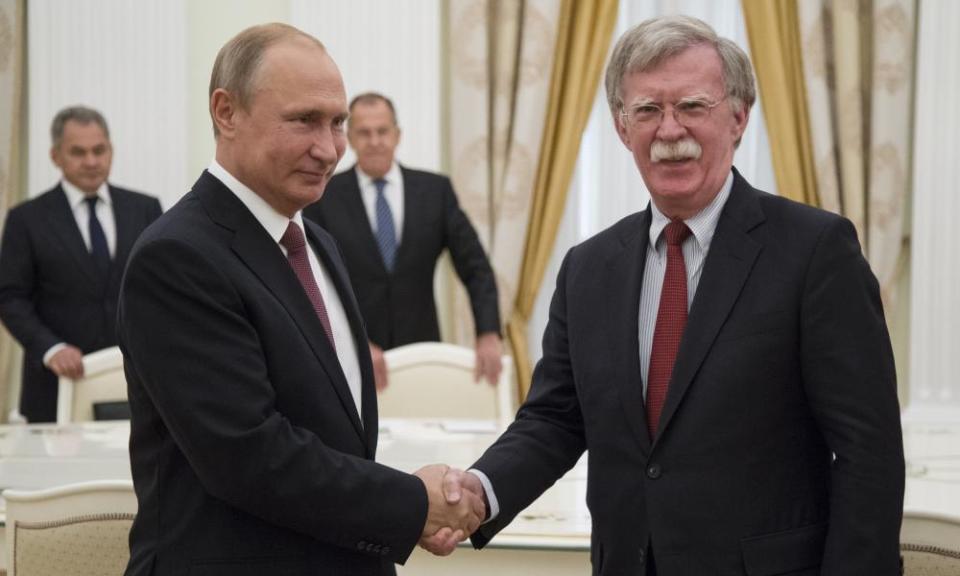The new John Bolton: Trump ally swaps fire and brimstone for a spoonful of sugar
Trump’s national security adviser seems to have abandoned his firebrand persona – and in Moscow the change of tone was striking

The trademark walrus moustache was still there, and the penetrating gaze was just the same, but in almost every other way the new John Bolton and the old John Bolton seemed very different.
The old Bolton was a firebrand pundit, raining derision from television talkshows and editorials on US diplomats promoting compromise with America’s enemies. Almost a year ago he wrote a commentary describing Vladimir Putin as a serial liar responsible for an “act of war” in the form of his interference in the US election and warned: “We negotiate with Russia at our peril.”
He described the nuclear deal with Iran, by which Tehran reduced its uranium stockpile by 98%, as an “American Munich” comparable to Neville Chamberlain’s short-lived agreement with Hitler, and he derided US diplomats as “appeasers” for pursuing contacts with adversaries for their own sake.
That was then, but this is now. And Bolton is now national security adviser to Donald Trump, whose defining diplomatic style is chumminess with dictators. In the past month, Bolton has shaken hands with Kim Jong-un and Vladimir Putin, with smiles all round. Face to face with Putin on Wednesday, Bolton replaced fire and brimstone with a large dose of honey.
“It’s great to be back in Moscow,” he told the Russian leader. “We are most appreciative of your courtesy and graciousness here and I look forward to learning how you handled the World Cup so successfully, among other things.”
The old Bolton would undoubtedly have pointed out that at the same time Russia was reported to be carrying out blanket bombing of civilian areas in Deraa, southern Syria, an area that Putin and Trump agreed a year ago in Hamburg, would be a de-escalation zone, that the US president claimed would save countless lives.
What appears to have happened is that Russia used the deal to help neutralise the rebel threat in the south until the Syrian regime was ready to attack the rebels and crush them.
The secretary of state, Mike Pompeo, admitted in the Senate on Thursday that Russia was violating Putin’s agreement with Trump and said it was “unacceptable”.
Meanwhile, Russian-backed separatists are on the offensive in Ukraine, where a Dutch and Australian investigation confirmed last month there was direct Russian involvement in the 2014 shooting down of a Malaysian civilian airliner.
After meeting Putin on Wednesday, Bolton denied the US had abandoned its positions on Syria and Ukraine and defended the idea of summitry for its own sake, allowing leaders to get acquainted even if the other leader involved is doing terrible things.
“I don’t think it’s unusual for the leaders of Russia and the US to meet,” he said. “Direct communications between Trump and Putin is in the best interests of the United States.”
The change in tone is even more evident in relation to North Korea. In January this year, Bolton said: “Talking to the North Koreans is a waste of time.” He repeatedly insisted that the only subject of discussion at a summit should be the details of how North Korean nuclear weapons would be dismantled and removed.
“I think it’s important if the president sees that they’re just looking for a way to waste time, that he make the point that he’s not there to waste time and that we expect real denuclearisation, not talks about talks about denuclearisation,” he wrote.
It is clear that Trump’s Singapore meeting with Kim Jong-un stopped very much short of that. The US failed in its effort to have its language insisting on “complete verifiable irreversible disarmament” and setting out a timetable.
Instead, Trump unilaterally suspended joint military exercises with South Korea, to the surprise of the government in Seoul and to the US military. In return, he claimed to have won a pledge from Kim to destroy a missile engine testing site. In terms of the overall North Korean weapons programme, the site was a small element, and there is no evidence so far that it has been dismantled.
Meanwhile, satellite imagery showed that since the Singapore summit, the North Koreans have made rapid and substantial improvements to their nuclear reactor in Yongbyon.
Before taking his new job, Bolton had frequently warned about Pyongyang giving the impression of being open to talks as a cover to carry on its weapons programme.
“Appeasing authoritarianism comes in many forms. All of them are ugly. Some are obvious and extremely dangerous, and some are subtle, indicating a mindset portending future danger because of a propensity to ignore reality,” Bolton wrote in February this year.
Leon Aron, director of Russia studies at the American Enterprise Institute, argued that a certain amount of intellectual flexibility is simply part of going into government.
“I think the bureaucratic rule holds that where you sit determines where you stand,” Aron said. “He is a diplomat now. He is tasked with greasing the skids for a summit, so he took off one hat and put on another. I don’t think that’s nefarious.”
Back in Moscow at a post-Putin press conference, the new Bolton had a one-line answer to a flurry of questions about what had become of the old Bolton.
“I don’t address what I have said before,” he said.

